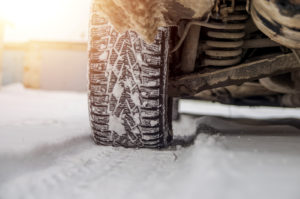Winter Tires vs. All-Season Tires: Your Complete Guide
June 17th, 2020 by Fix Auto USA

Deciding between winter tires and all-season tires is often difficult. If you understand the similarities and differences between winter and all-season tires, however, you can get the right tires so you can drive your car safely year-round.
What Are Winter Tires?
Winter tires are engineered for black ice, heavy snowfall, and other winter weather conditions. They offer superior traction in comparison to all-season tires, thanks in part to the following features:
- Tread Rubber: Whereas the tread rubber of all-season tires tends to be stiff, the tread rubber of winter tires is flexible to ensure that the tires can grip the road better.
- Tread Depth: Winter tires come equipped with deep tread depths to help minimize snow buildup and improve traction.
- Tread Patterns: The tread patterns of winter tires are designed to help remove snow, slush, and water.
- Biting Edges: Winter tires include thousands of tiny slits within the tread itself; these slits help increase tire traction on ice.
Winter tires may seem like a costly investment at first, but their benefits can be significant. In addition to helping you drive safely on snowy and icy roads, winter tires reduce the risk of skidding if you need to stop suddenly on a cold, slippery surface. Winter tires also minimize the danger of hydroplaning, as they feature specialty grooves to help push water off to the side.
Best Winter Tires
Many winter tires are available, and some of the best options on the market today include:
1. Bridgestone Blizzak WS80
Bridgestone Blizzak WS80 tires are among the top-rated winter tires by Car and Driver and other industry-leading automotive publications. The tires help drivers maintain reliable handling in harsh winter weather. They also include bite particles for increased traction on ice.
2. Dunlop Winter Maxx WM02
Dunlop Winter Maxx WM02 tires are constructed from a winter-focused compound and feature a distinct asymmetric tread pattern. The winter tires include a broad profile and wide, circumferential grooves to enhance handling and hydroplaning resistance. In addition, the tires have biting edges for increased traction on snow and ice.
3. Pirelli Winter Sottozero 3
Pirelli Winter Sottozero 3 tires are designed for high-end cars from BMW, Jaguar, and other premium brands. The winter tires offer a directional double arrows tread pattern design and functionalized compound for superior grip on snowy and icy roads. They also include wide grooves and 3D sipe technology to help improve braking performance.
As you search for winter tires, it is crucial to consider a wide range of options. In doing so, you can find the right winter tires for your vehicle and benefit from these tires year after year.
What Are All-Season Tires?
All-season tires deliver consistent performance across a variety of road conditions. When compared to winter tires, all-season tires provide inferior performance in certain areas, so drivers can use these tires throughout the year.
All-season tires do not provide the same level of grip as winter tires. They are also not specifically designed to perform on snowy and icy roads in the same way as winter tires.
Ultimately, you may want to consider all-season tires if you live in an area that has a moderate climate. If you rarely, if ever, have to drive in extreme winter weather conditions, you may benefit from choosing all-season tires over winter tires.
Are All-Season Tires Good for Snow?
If you’re driving on all-season tires and it starts to snow, you’ll be OK. But, the performance of all-season tires in snow pales in comparison to that of winter tires.
Winter tires are built for snow and other extreme winter weather conditions. If you may have to travel on snowy and icy roads frequently in wintertime, you’ll benefit from winter tires.
Best All-Season Tires for Snow
The best all-season tires for snow include:
1. Continental Extreme Contact
Continental Extreme Contact all-season tires are often great options for sports cars, performance sedans, and trucks. The tires feature SportPlus technology to help increase traction on wet surfaces. They also include ridges in the bottom of the tread grooves to enhance traction in snow.
2. Bridgestone DriveGuard
Bridgestone DriveGuard tires come equipped with run-flat technology — so if one of your tires gets punctured during a snowstorm, you’ll still be able to safely drive on the tire for at least 50 miles at a speed of 50 mph. The tires also feature an asymmetric tread design for predictable handling, along with circumferential and cross grooves and biting edges to improve traction on snowy roads.
3. Michelin Latitude Tour
Michelin Latitude Tour all-season tires are among the top tires available for crossover vehicles. The tires feature 2-D Active Sipes to deliver enhanced performance in snow and rain. Furthermore, the tires are backed by a 65,000-mile manufacturer’s warranty.
When shopping for all-season tires, consider various options. You can then browse different all-season tires and discover the right ones for your car. Finally, you can install these tires on your car and keep them on your vehicle for an extended period of time.
Should You Install Winter or All-Season Tires on Your Own?
Once you decide between winter and all-season tires and make your tire selection, you’ll likely want to install the tires on your car as quickly as possible. In order to ensure the tires you select are installed properly, you need to find an expert auto body shop.
An auto body shop employs professionals who understand the ins and outs of tire installation. These professionals can fit your tires to your car and mount, balance, and align the tires.
If you select all-season tires, auto body shop professionals can install the tires and perform an alignment, rotation, and other maintenance at regular intervals. Or, if you choose winter tires, auto body shop professionals can install them in fall, then swap out your winter tires with all-season or summer tires at your convenience.
When it comes to all-season and winter tire installation, it helps to work with a top-notch auto body shop. That way, you can quickly and easily install your all-season or winter tires and ensure you’re well-equipped to drive your car in winter weather conditions.
This blog post was contributed by Fix Auto Capitola a leading industry expert and collision repair shop servicing the Capitola, Pleasure Point and Soquel neighborhoods.
Welcome to
Fix Auto USA
We are the premier independent body shop network delivering world-class customer service and high-quality collision repairs across the U.S.
Learn About Us





